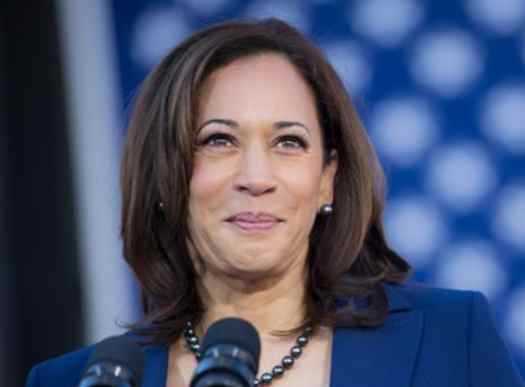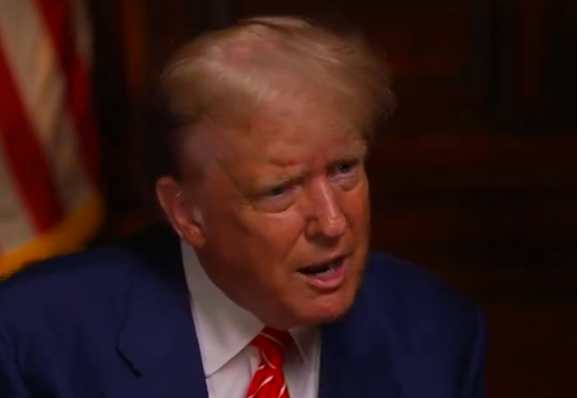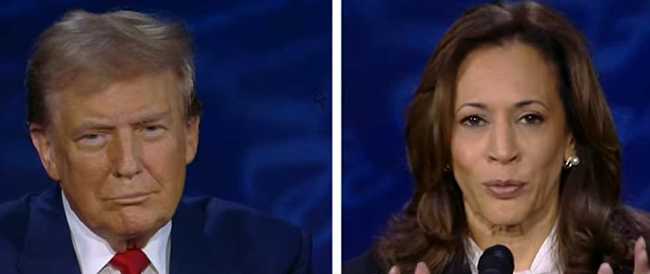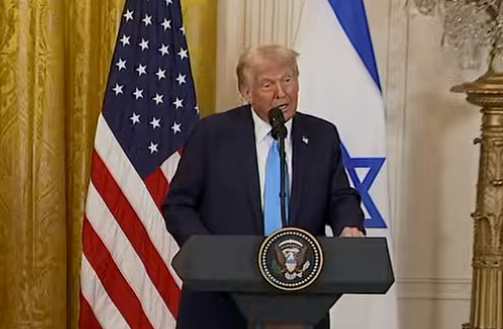Trump claimed that neither Russia’s invasion of Ukraine nor the shock Hamas attack last October 7 on Israel would have occurred if he were president. He said that if elected, he would solve both conflicts before he even takes office next January but did not say how.
Harris retorted, “If Donald Trump were president, (Russian President Vladimir) Putin would be sitting in Kyiv right now with his eyes on the rest of Europe.”
Trump twice refused to say that he wants Ukraine to win the war, only that he wants the war ended to prevent more bloodshed.
Standing a short distance away from each other, the two candidates shook their heads at each other’s comments, with Harris all but laughing out loud at some of Trump’s remarks. ABC News anchors David Muir and Linsey Davis gamely tried to control the flow of the encounter, failing at times.
Tens of millions of Americans were likely watching what could be the only debate of the campaign. The faceoff took place eight weeks before Election Day but only days ahead of when early voting starts in some of the country’s 50 states.
On the debate stage, the rules for Harris and Trump were the same as at the debate Trump had with Biden in June, where Biden stumbled badly, leading him a month later to end his reelection bid as he fell behind Trump in national polling.
Trump and Harris’ microphones were muted when the other was speaking and they were not allowed to pose questions to each other.
But that did not stop them from interrupting each other. There was no live audience listening to the debate.
It was the first presidential debate for Harris. For Trump, it was his seventh over three presidential election cycles since 2016.
Speaking to reporters after the debate, Republican Senator Tom Cotton questioned why Harris has not worked to implement her policy proposals during her time as vice president.
“Kamala Harris wouldn’t answer questions about what she’s going to do for the American people and kept trying to shift onto other topics. Understandably, Donald Trump defended himself, but what he did the best job of is explaining that things were good when he was president and they have not been good for the last four years.”
Democratic Senator Chris Murphy said it was Trump who failed to explain what he would bring to a new term in office.
“The real question is, what does Donald Trump stand for? You can have a conversation about how some of Kamala Harris’ positions have changed, as all of our positions have changed over the years based on new information, or we can ask ourselves did Donald Trump articulate a single plan tonight to help the American people? Besides his reiteration of his belief that we should build a wall with Mexico, I don’t think he talked about one single plan — no healthcare plan, no housing plan, no plan to increase wages.”
Democratic Congressman Ted Lieu told VOA Khmer that Trump is weaker on foreign policy than Harris, and that Trump is “friendly to dictators.”
“Donald Trump has this weird relationship where if Putin flatters Donald Trump, Donald Trump gives away the store to Vladimir Putin. In contrast, the Biden-Harris administration built up this entire coalition to stop Vladimir Putin in Ukraine, and the Biden-Harris administration has built up an incredible alliance of countries in the Indo-Pacific to push back against aggression,” Lieu said.
Republican Congressman Matt Gaetz told VOA Khmer that Trump won the debate by highlighting Harris’ “dangerously liberal policies.”
“President Trump did his job to show people that he is the change agent in this election. President Trump reflected the economic anxiety of the American people, the concern the American people have over their safety and over their ability to live in a world that isn’t going to devolve into World War III,” Gaetz said.
National polling shows the contest to be close, adding to the importance of the debate and making it crucial for both candidates to make their best case to sway the small number of voters who haven’t made up their mind. At stake, returning Trump to the White House after he lost reelection in 2020 to Biden or elevating Harris, Biden’s second-in-command.
Democrats coalesced around Harris’ candidacy when Biden dropped his reelection bid and endorsed Harris as his successor. While Biden trailed Trump when he ended his campaign, Harris has edged ahead of Trump in numerous national polls by 2 or 3 percentage points.
But a New York Times-Siena College poll released Sunday showed Trump with a 48-47% lead nationally, even as the newspaper said Harris was narrowly ahead in an average of multiple polls in three crucial battleground states: Wisconsin, Michigan and Pennsylvania. The two candidates were tied in four other crucial states: Arizona, Georgia, Nevada and North Carolina.
The seven highly contested states are expected to play an outsized role in determining the outcome of the election because the U.S. does not pick its president and vice president by the national popular vote.
Rather, the election is 50 state-by-state contests, with electors for the winning ticket in all but two states casting all their votes in the Electoral College for either Harris and her vice presidential running mate, Minnesota Governor Tim Walz, or Trump and his ticket mate, Ohio Senator JD Vance. The number of Electoral College votes for each state is based on population, so the most populous states hold the most sway.
The Times-Siena poll showed that the debate stakes were particularly high for Harris in introducing herself to the American public, with 28% of those surveyed saying they needed to know more about her, while only 9% said the same about Trump.
Trump, 78, has at times on the campaign trail seemed to miss running against Biden, 81. He has yet to develop a steady line of attack on Harris, 59, although on debate night he attacked Harris on every question posed by the ABC anchors.
If elected, she would be the first woman and first person of South Asian descent to serve as the U.S. president, and the second Black person after Barack Obama.
[content id=”52927″][content id=”79272″]
Pages: 1 2







